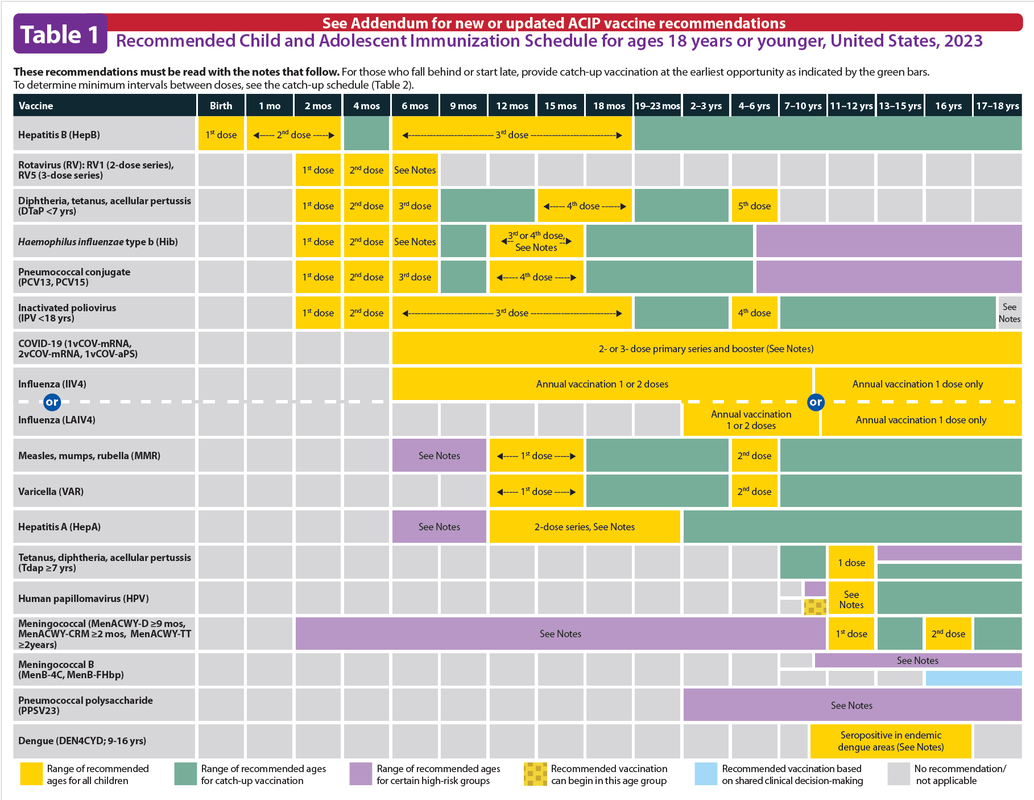CDC Recommended Child and Adolescent Immunization Schedule
This message is brought to you by the Georgia Chapter – American Academy of Pediatrics.
The risks of the diseases that vaccines prevent are far greater than the unproven concerns about their safety. We encourage all parents to ensure their children’s health by immunizing them on time.
Routine childhood vaccination produced a tremendous decline in serious infections. Lives have been saved and suffering prevented. Before a vaccine was available, nearly everyone developed measles during childhood. Each year in the U.S., about 50,000 were hospitalized, 1,000 cases of permanent brain damage and 500 deaths occurred. Polio paralyzed 20,000 people per year, causing 1,000 deaths. Vaccines do a wonderful job of preventing illness, complications, and saving lives.
Immunizations are safe. Vaccines are extensively studied to show that they provide protection. Part of this research includes testing new vaccines along with existing vaccines that are given at the same time. The new vaccine must show that it does not decrease the effectiveness of the other vaccines and does not result in higher reactions. Vaccine safety is monitored by the Food and Drug Administration and the Centers for Disease Control and Prevention (CDC).
Parents who delay or decline vaccination put their children at risk. Outbreaks of measles this year demonstrate that measles is just a plane flight away from countries where vaccine rates are low. 63 of the 64 U.S. cases of measles occurred in unvaccinated people.
The vaccine schedule recommended by the American Academy of Pediatrics (AAP) and the CDC gives vaccines when they are most effective. Multiple vaccine doses over time are necessary to provide adequate protection. Delaying vaccines puts children and the community at unnecessary risk. Giving the vaccines on the recommended schedule ensures they have immunity at the age when the child is most susceptible to a preventable disease. When immunizations are delayed, we lose the opportunity to prevent diseases that occur in infancy and early childhood.
Some people are concerned about mercury preservatives in vaccines. There has never been any scientific evidence that showed a child has been harmed by thimerosal, the mercury based preservative that had been used in vaccines in the past. Major studies in Sweden, Denmark, the United Kingdom, and the United States have shown no association between thimerosal containing vaccines and autism. Other studies provide evidence that MMR (measles, mumps, and rubella ) vaccine does not cause autism. A recent study in California looked at cases of autism and other brain disorders. They compared the diagnosis of autism prior to 2001 (the year thimerosal was removed from vaccines, except some influenza vaccines) with the rate of diagnosis after 2001. If thimerosal in vaccines caused autism, the rate should have fallen after the preservative was removed. The study showed that the rate increased.
Parents are faced with a seemingly overwhelming amount of information about vaccines and possible side effects. We encourage them to look for sources that are based on scientific evidence rather than anecdote and emotion. A list of useful internet sites is provided for parents who desire more information.
www.cispimmunize.org (AAP)
www.cdc.gov/vaccines (CDC)
www.immunizationinfo.org (National Network for Immunization Information)
www.immunize.org (Immunization Action Coalition)
www.vaccinateyourfamily.org/ (Vaccine Resources)
https://www.cdc.gov/coronavirus/2019-ncov/your-health/index.html (CDC "Your Health" COVID-19 Information)
Routine childhood vaccination produced a tremendous decline in serious infections. Lives have been saved and suffering prevented. Before a vaccine was available, nearly everyone developed measles during childhood. Each year in the U.S., about 50,000 were hospitalized, 1,000 cases of permanent brain damage and 500 deaths occurred. Polio paralyzed 20,000 people per year, causing 1,000 deaths. Vaccines do a wonderful job of preventing illness, complications, and saving lives.
Immunizations are safe. Vaccines are extensively studied to show that they provide protection. Part of this research includes testing new vaccines along with existing vaccines that are given at the same time. The new vaccine must show that it does not decrease the effectiveness of the other vaccines and does not result in higher reactions. Vaccine safety is monitored by the Food and Drug Administration and the Centers for Disease Control and Prevention (CDC).
Parents who delay or decline vaccination put their children at risk. Outbreaks of measles this year demonstrate that measles is just a plane flight away from countries where vaccine rates are low. 63 of the 64 U.S. cases of measles occurred in unvaccinated people.
The vaccine schedule recommended by the American Academy of Pediatrics (AAP) and the CDC gives vaccines when they are most effective. Multiple vaccine doses over time are necessary to provide adequate protection. Delaying vaccines puts children and the community at unnecessary risk. Giving the vaccines on the recommended schedule ensures they have immunity at the age when the child is most susceptible to a preventable disease. When immunizations are delayed, we lose the opportunity to prevent diseases that occur in infancy and early childhood.
Some people are concerned about mercury preservatives in vaccines. There has never been any scientific evidence that showed a child has been harmed by thimerosal, the mercury based preservative that had been used in vaccines in the past. Major studies in Sweden, Denmark, the United Kingdom, and the United States have shown no association between thimerosal containing vaccines and autism. Other studies provide evidence that MMR (measles, mumps, and rubella ) vaccine does not cause autism. A recent study in California looked at cases of autism and other brain disorders. They compared the diagnosis of autism prior to 2001 (the year thimerosal was removed from vaccines, except some influenza vaccines) with the rate of diagnosis after 2001. If thimerosal in vaccines caused autism, the rate should have fallen after the preservative was removed. The study showed that the rate increased.
Parents are faced with a seemingly overwhelming amount of information about vaccines and possible side effects. We encourage them to look for sources that are based on scientific evidence rather than anecdote and emotion. A list of useful internet sites is provided for parents who desire more information.
www.cispimmunize.org (AAP)
www.cdc.gov/vaccines (CDC)
www.immunizationinfo.org (National Network for Immunization Information)
www.immunize.org (Immunization Action Coalition)
www.vaccinateyourfamily.org/ (Vaccine Resources)
https://www.cdc.gov/coronavirus/2019-ncov/your-health/index.html (CDC "Your Health" COVID-19 Information)


